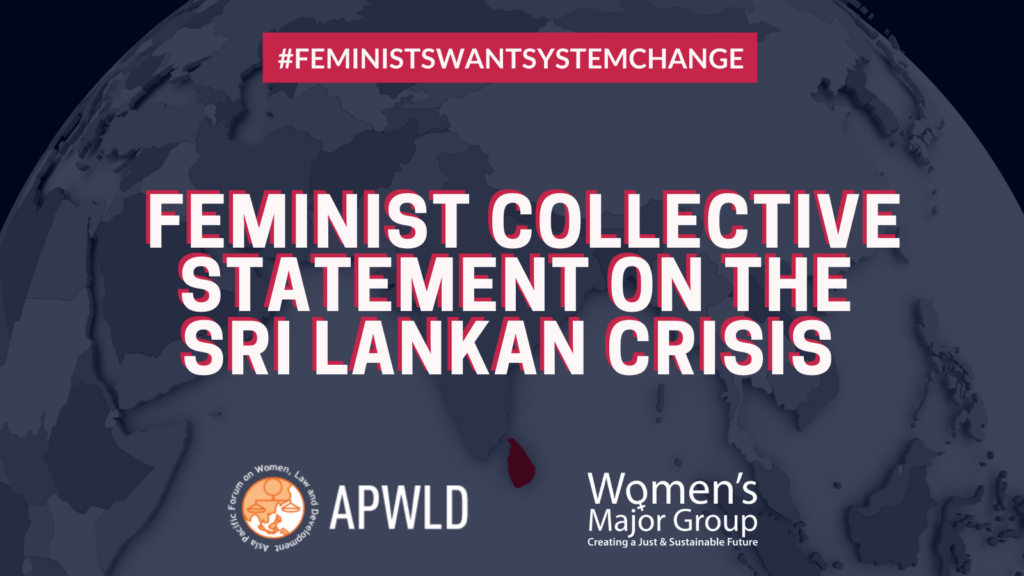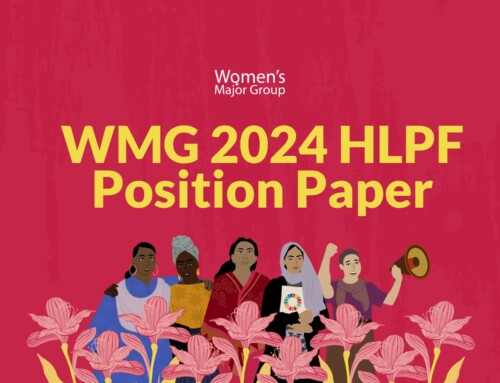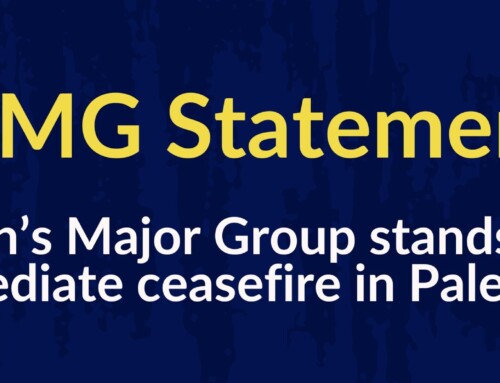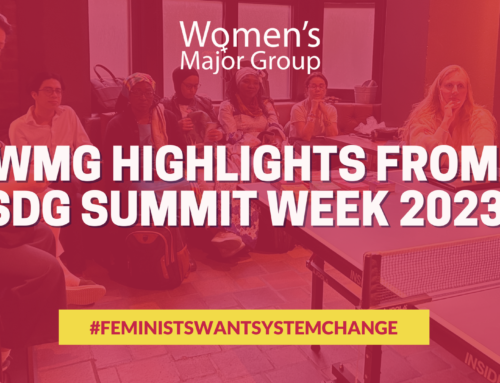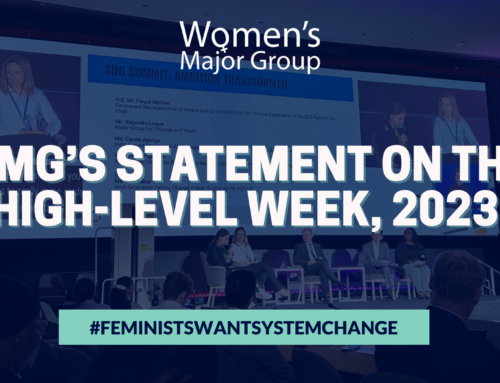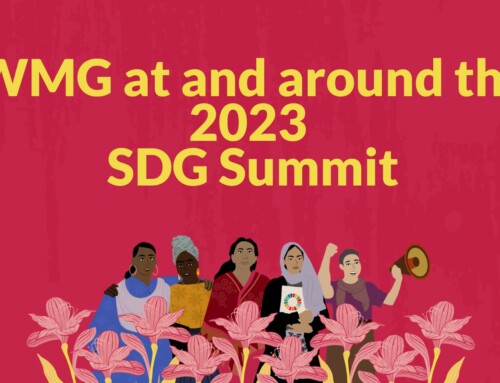(Collective statement by Asia Pacific Forum on Women, Law and Development and Women’s Major Group)
We stand in solidarity with the people of Sri Lanka, particularly with the grassroots women who are currently struggling against an unprecedented economic crisis that has been catastrophic for the nation’s 22 million people, and a crackdown on people’s democratic rights.
Sri Lanka’s major concerns have been shortages of basic needs services, lengthy blackouts and spikes in inflation where food prices have risen to nearly 60% and the Sri Lankan rupee has crashed to 80% reducing people’s purchasing power. The grave mismanagement of financial resources has led to bankruptcy and poor implementation of programmes. The country has relied on external debt and the usable foreign reserves has become too low to cover their needs from the international market. Sri Lanka imports US$3bn more than it exports every year, resulting in the exhaustion of foreign currency reserves. At the end of 2019, it had US$7.6bn in foreign currency reserves, which have dropped to around US$250m.(1)
The financial crisis has further fueled the power struggle between the President and the parliament followed by civil unrest and led to the continuing deterioration of human well-being. The Sri Lankan government, historically, has also always been hounded by corruption, lack of accountability, transparency and gender responsiveness, and nepotism that further undermine many facets of human rights. Decreasing public financing and support to social services has been deteriorating quality of life and the well-being particularly of marginalised groups including women and girls. Delivery of sexual and reproductive health services, including maternal health care and access to contraception is severely impacted (2) and many young women have been experiencing a medical crisis as the current economic crisis affects supplies of medicines and equipment, leading to increasing maternal mortality. Amid fuel and medicine shortages, the crisis has also increased women and girls’ vulnerability to violence.
Presently, the Sri Lankan Government has been lobbying with the International Monetary Fund (IMF) and World Bank (WB) for a bailout, which could be another detrimental blow to their struggling economy. The situation in Sri Lanka should shed light on the broken system of neoliberal global economic governance and expose the role of the World Bank and IMF in this economic crisis.
The World Bank supported the development of Free Trade Zones (FTZ) in Sri Lanka, aiming to attract Foreign Direct Investment (FDI) and foreign companies, involving global brands and their apparel suppliers. This while corporations have been enjoying the incentive schemes, including tax holidays, tax breaks and subsidies. Eighty five percent (85%) of the workers in FTZs in Sri Lanka are women. Most women migrated from rural areas and are generally economically marginalised with the hope to improve their and their family’s quality of life, but instead, they are hired as low-wage workers and trapped in labour exploitation (Women’s Centre, 2022). In Katunayake FTZ, thousands of garment workers have to cope with long working hours for little pay and are forced to work in an exploitative system where it is difficult to get unpaid sick leave.
Soaring cost-of-living crises brought more misery for women workers who have been working in low-standard employment and harsh conditions. Some experienced retrenchment, and for the rest, the pay and benefits are rock-bottom. They are forced to bear the risk of economic recession. “This time is very difficult…. Day by day it becomes very difficult to live. And the facilities inside the factories are decreasing more and more. We don’t understand how we can face this. We can’t even go to the village. The situation in houses is even more difficult.” said a Katunayake FTZ woman worker (Stand Up Movement Lanka, 2022). Seventy eight percent (78%) of total garment workers in Sri Lanka have further deteriorated due to the crisis brought by the pandemic (Women’s Centre, 2021).
The crisis also results in tripling the burden of women in their households and communities to provide food for their families. According to the latest World Food Programme report, there are now 6.26 million Sri Lankans or 3 out of 10 families unable to provide their next meal. Inflation has also been impacting the purchasing power of the lower middle class, widening further the inequality gap and worsening poverty situations. This also affects nutrition of pregnant and lactating mothers, as they lack access to healthy and nutritious food due to the crisis. The crisis has indeed worsened the lack of social protection. Previous programmes such as Samurdhi have proven to be ineffective and a waste in resources as it continues to lack a structured mechanism for management, monitoring and evaluation, and accountability from government agencies.
During the High Level Political Forum 2022, Sri Lanka delivered its Voluntary National Review (VNR), which was a crucial moment to reflect these realities. However, there were no civil society representatives physically present from Sri Lanka to deliver in-person their collective statement. This signals the lack of transparency and accountability, and shrinking space for democratic participation in the development processes. The situation in Sri Lanka is also a wake-up call (if not too late) to many countries in the Asia Pacific region on the implications of debt traps, unfair trade rules, illicit financial flows, among others.
In this regard, we present the following recommendations in the context of the Sri Lankan crisis:
● For multilateral institutions especially the UN to come up with a mechanism that will allow cancellation of the principal, interest and charges on sovereign external debt of the country without future accruals;
● For multilateral institutions such as the Organisation for Economic Cooperation and Development–Development Assistance Committee (OECD-DAC) to come up with ODA for gender-responsive, human rights-based effective development cooperation to bring Sri Lanka from the current crisis of development;
● For the government to act with transparency and accountability in the financial management and resource allocation;
● For the government to provide subsidy to sectors being severely affected by the crisis, as well as ensure financing for public services well appropriated;
● For the government to recognise and uphold the rule of law in confronting civil society demands and recommendations;
● For the government to respect human rights and right to organise of peoples’ movements and civil society organisations, including to provide guarantee for the worker’s rights to organise and collective bargaining without threats of dismissal or any other reprisals;
● For the government to ensure people’s right to health, including sexual and reproducitve health and rights and provide equitabble access to medicines, treatments and vaccinations as part of the universal health coverage;
● For the government to ensure survivors of gender-based violence have timely access to justice and life-saving services, including but not limited to comprehensive and quality medical treatment and emergency protection services.
● For the government to recognise the role of civil society groups in engaging and forwarding recommendations in the development process, which includes policy proposals in partnerships and stakeholder involvement in development programmes;
● And finally, the government and multilateral institutions to recognise the systemic root causes of the crisis today in Sri Lanka in order to provide the appropriate solutions such as rejuvenation efforts for the local economy and not to include any austerity measures, and/or privatisation of public services.
We stand in solidarity to dismantle this system of oppressions. We stand with the Sri Lankan grassroots women and their communities and civil society organisations in demanding transformative change. We demand human rights and Development Justice. ###
Reference:
Asia Pacific Forum on Women, Law and Development: apwld@apwld.org
For media interviews: edz@apwld.org
—
1 https://www.bbc.com/news/world-61028138

